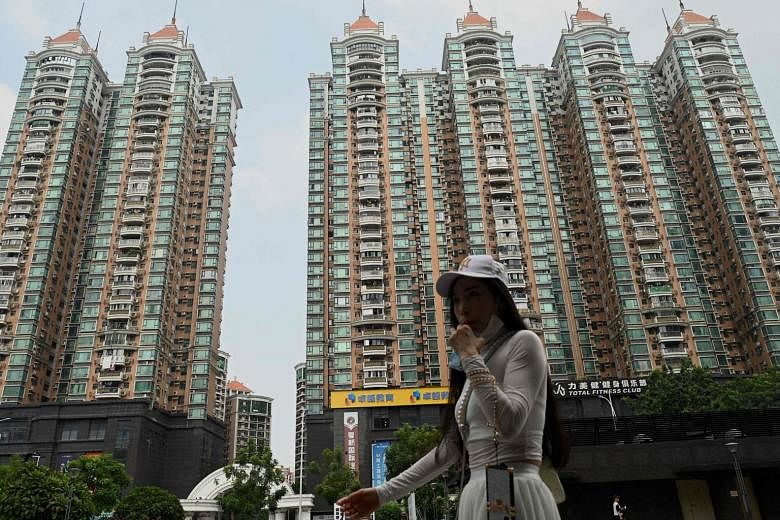BEIJING (BLOOMBERG) - China is ramping up support of the embattled real estate sector as growing stress in the industry threatens to deepen an economic slowdown.
December is poised to be a record month for Chinese offshore corporate defaults after missed payments by indebted companies including China Evergrande Group and Kaisa Group Holdings. Chinese firms have defaulted on a record US$3.8 billion (S$5.2 billion) in offshore bonds so far this month, data compiled by Bloomberg show.
The previous monthly high was in January when Chinese borrowers failed to repay US$2.7 billion of such notes.
A month that saw Evergrande and Kaisa officially labelled defaulters, December has seen a precarious rally in Chinese junk bonds threatened by heightened anxiety over the financial health of other companies such as Shimao Group Holdings and Guangzhou R&F Properties as a liquidity crisis sparked by a government crackdown on excessive borrowing by developers ripples through the sector.
This year has seen Chinese borrowers default on US$13.3 billion of offshore bonds, with real estate firms making up half of the total, according to data compiled by Bloomberg.
More credit risk is simmering, with January set to be an even busier month for maturities. Chinese developers need to repay or refinance about US$6 billion dollar bonds by then, according to data compiled by Bloomberg.
Guangzhou R&F is asking holders of a US$725 million dollar note maturing Jan 13 to extend the due date by six months, and is offering to buy back some of the debt at a discount. If the proposals are not backed, the company said it might not be able to fully pay off the note.
A record pace of defaults and downgrades for Chinese borrowers has recently sent junk dollar bond yields to a record high. Such surging borrowing costs have shut down offshore refinancing channels for Chinese firms, and an HSBC report last week said such funding will reopen only to the highest-quality Chinese property developers in the second half of 2022.
Now, the authorities are encouraging banks to fund acquisitions of projects of distressed developers and pushing financially healthy property firms to make such purchases, the central bank-backed Financial News reported on Monday (Dec 20).
China is also providing credit support to an economy showing strain from the property slump, with domestic banks on Monday lowering borrowing costs for the first time in 20 months.
The move follows action by the People's Bank of China earlier this month to cut the amount of cash banks must hold in reserve, freeing up 1.2 trillion yuan (S$257 billion) of cheap long-term funds for lenders.
Regulators have eased up on a clampdown on leverage in the property sector in recent weeks, such as by encouraging stronger real estate firms to tap the onshore interbank bond market for financing. Lenders will be urged to help "quality" developers acquire projects of large developers faced with difficulties, the Financial News report said, citing a notice from the central bank and the nation's banking regulator.
The PBOC did not immediately reply a fax seeking comment.
The report also said the PBOC and the country's state-asset watchdog held a meeting recently with some large private and state-owned real estate companies to encourage them to acquire quality projects from distressed developers. Financial authorities have asked lenders not to "blindly" call back or cut off loans to struggling developers, it added.
Highly leveraged developers will look to dispose of assets and this presents opportunities for onshore capital, investment and fund managers, according to Jones Lang LaSalle Asia-Pacific chief executive Anthony Couse.
"The Chinese government will look with that controlling hand to support some of those developers as they divest assets to meet payments and look at corporate restructuring," Mr Couse said on Monday in an interview on Bloomberg Television.
Sunac China Holdings, the nation's fourth-biggest builder by sales, recently sold two real estate projects to rival Hangzhou Binjiang Real Estate Group as part of efforts to recoup cash.

